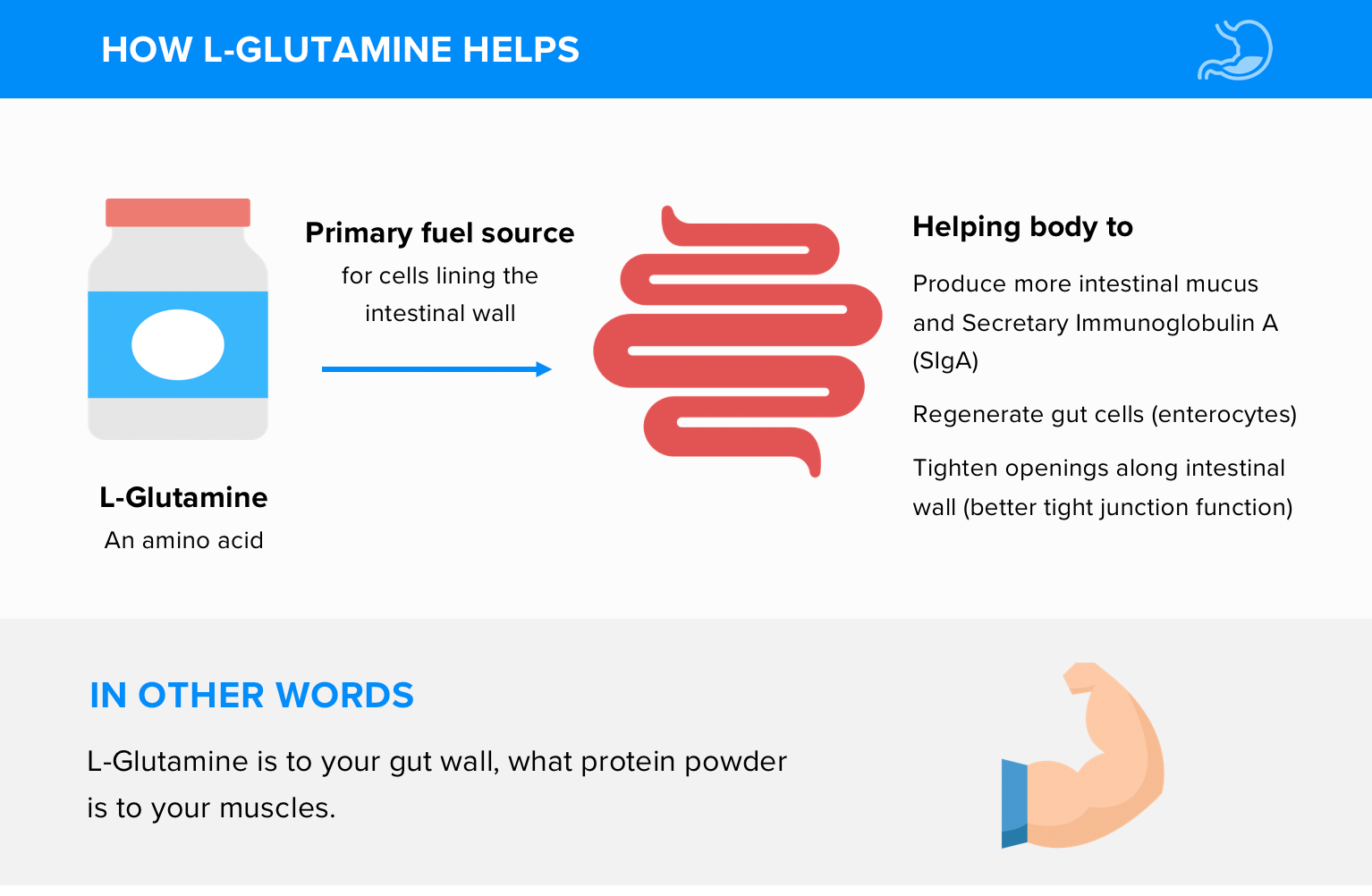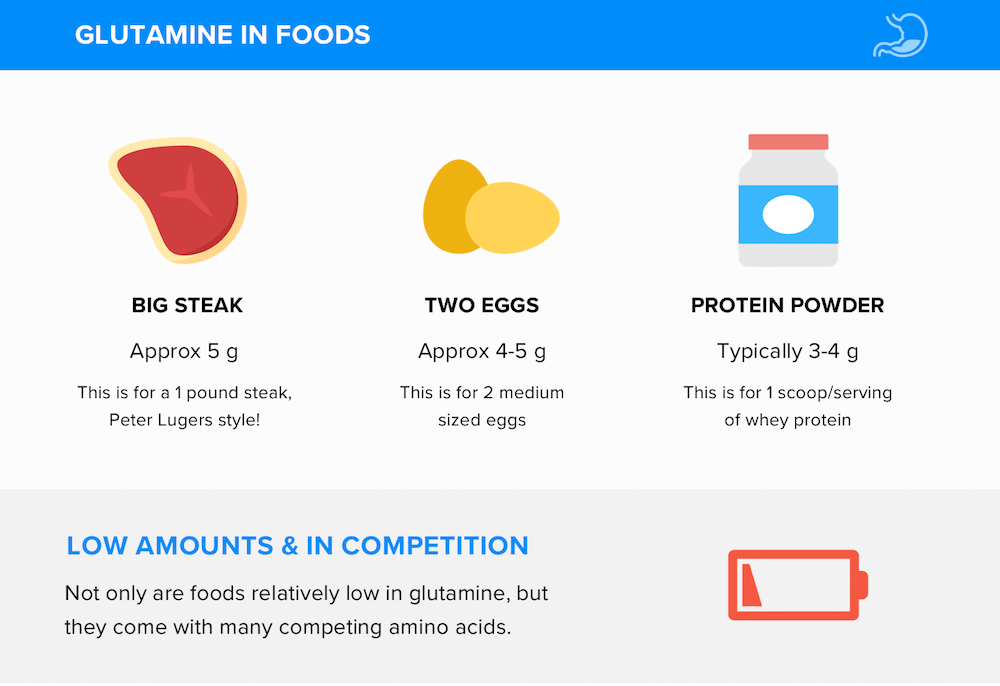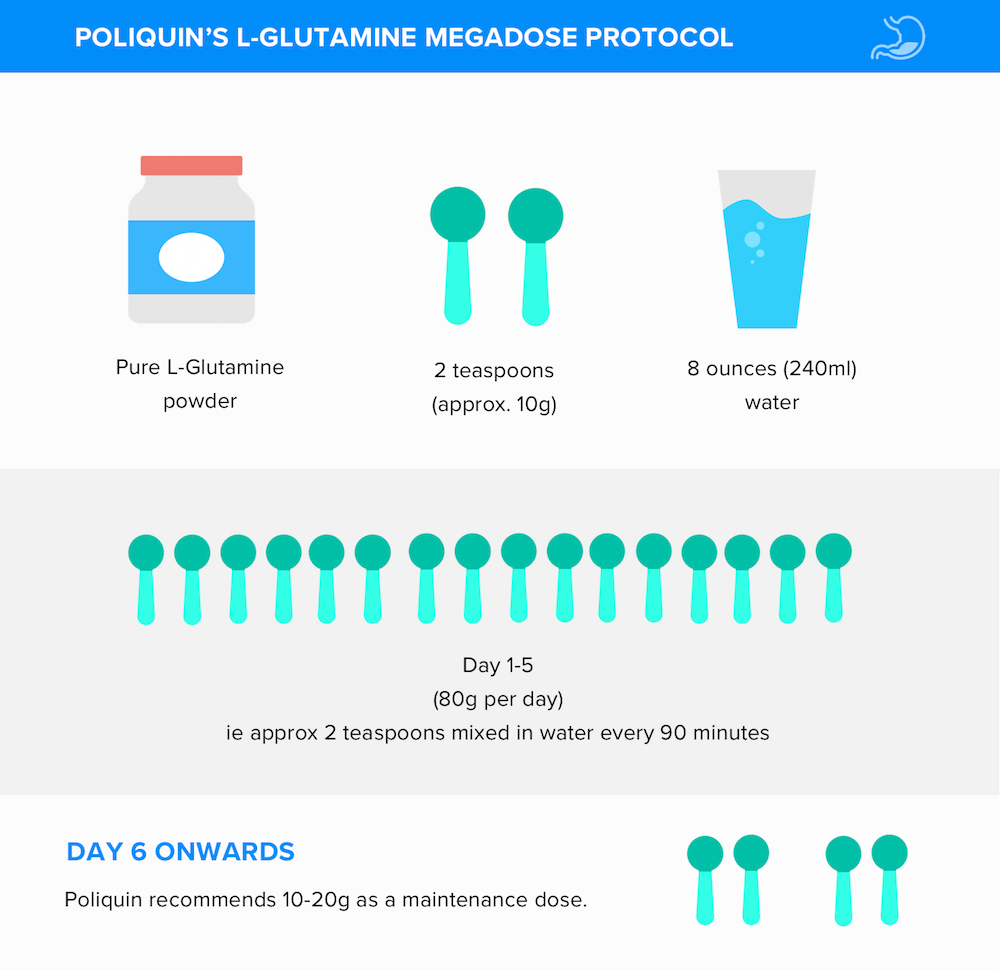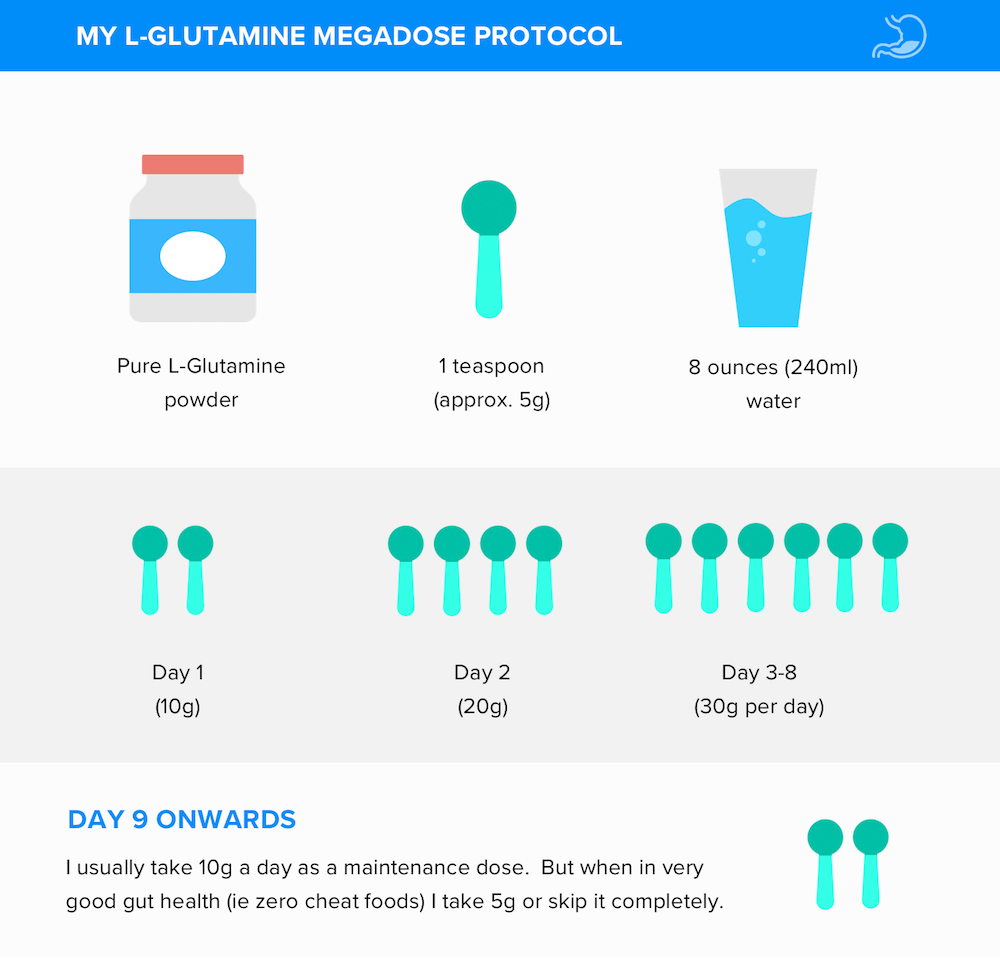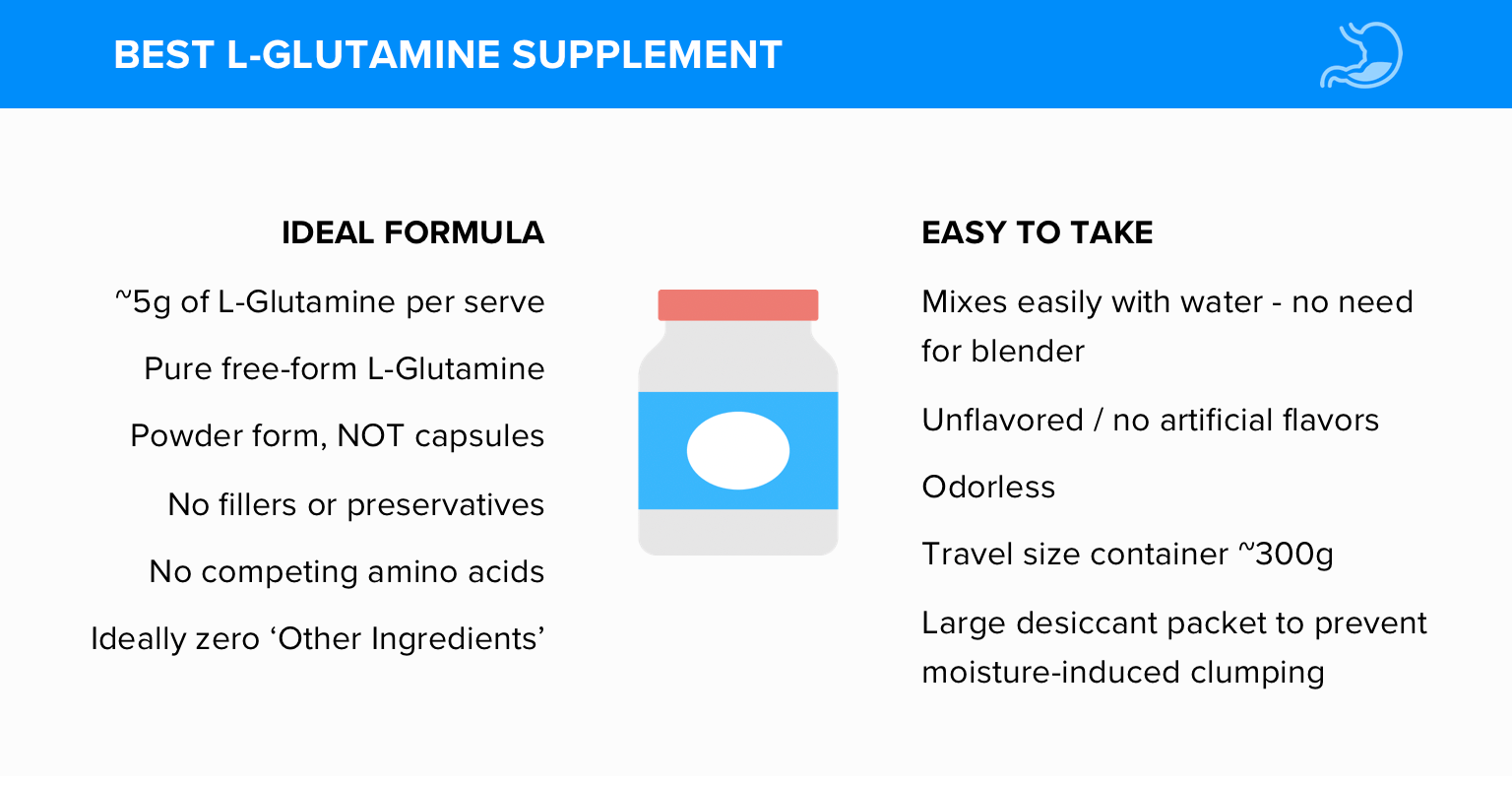Does L-Glutamine really help with leaky gut? And if so, how are you meant to use it in order to get good results? Well, that’s exactly what we’re going to explore in this ultimate guide to L-Glutamine for leaky gut!
Last Updated: Nov 11, 2023

In this guide, you’ll discover…
Whenever people get the ‘desert island’ question they usually hum and haw about what they’d take.
Maybe their favorite book. Or family photo album. Or perhaps their loved one.
Not me. I’ve already chosen my one thing. That’s right. It’s L-Glutamine!
In fact, I’m almost serious. You see, I always have a small tub of high quality, pure L-Glutamine powder with me. Even when I travel.
It’s such a simple and inexpensive supplement, and yet I find it has such a profound impact on my gut health.
But here’s the thing…
…in order to actually work, you need to search for a quality L-Glutamine product optimized for gut health and take it the right way for intestinal support, and NOT the same way that athletes (the other big users of L-Glutamine) take it.
This can be a bit complicated, so I’ll explain all of this below. Let’s dive in!
Why L-Glutamine helps leaky gut…in plain English
So as you probably know leaky gut happens when your gut lining is too permeable (or ‘leaky’ if you like). In scientific terms, this issue is know as intestinal hyperpermeability.
No matter how you refer to it, the bottom line is that things that shouldn’t go through your gut lining and into your bloodstream, do, such as undigested food particles, bad bacteria and toxins.
This issue of leaky gut can thus be associated with increased inflammation, digestive distress and even chronic illness1.
So how does L-Glutamine help with this?
Well, L-Glutamine helps strengthen the gut lining so this doesn’t happen so much – in particular it can help support our leaky gut by protecting the integrity of the wall/gut barrier, whilst also reducing existing digestive disturbances2.
Here’s how L-Glutamine works for leaky gut
Before we drown ourselves in the science, it is important to know that L-Glutamine is simply an amino acid. 1 of 20 amino acids in fact.
But here’s the thing…unlike many of the other amino acids, it is unique, because it is the primary fuel used by the cells in your gut lining3. They love it!
So much so that they’re actually able to absorb it directly4. Which makes supplementation even more effective.
And since it is their preferred source of fuel, these cells lining the intestinal wall consume it ravenously in order to repair and regrow themselves5.
By feeding these cells the fuel they love, here’s what happens…
- For starters, your body is able to produce more intestinal mucus and Secretory Immunoglobulin Type A (SIgA), a combination that soothes the intestine and regulates inflammation6 – hello digestive comfort!
- Plus it can help tighten up the openings in your gut lining themselves7, thereby reducing the chances of large undigested food molecules and other toxins crossing the gut barrier and into your bloodstream (ie reducing leaky gut).
- Now the coolest thing – when the gut barrier strengthens like this, the inflammation in your body starts to slow down8 since your immune regulators are working properly and fewer and fewer toxins and pathogens are successfully hitting your bloodstream9.
- Plus your immune system starts to enjoy some relief10 – and unsurprisingly it is able to strengthen. And that’s when you really start to enjoy the benefits that come from the repairing effects of L-Glutamine.
As you can see taking L-Glutamine is all about feeding your gut with the fuel it needs to be strong. Kind of the same way athletes and gym goers take protein powder to feed and support their muscles.
Best of all, L-Glutamine helps beyond leaky gut as it also supports your overall health
For example it can help support removal of waste (such as ammonia) from your system11, synthesize proteins and even help your body to maintain stable blood glucose levels12.
Because of the many and varied powers of L-Glutamine, unsurprisingly it is also used to support several other issues too.
For example, people with sugar cravings have been known to use it since it appears to reduce this desire through stablizing blood sugar13. And that’s a huge side benefit for us leaky gutters who are trying to cut sugar out of our diets. (This benefit alone makes L-Glutamine a desert island hero!)
And for those of us that enjoy the occasional drink (like delicious red wine), L-Glutamine also can help protect the gut from injury due to alcohol14, making it a post-party must have.
For such a simple 1-ingredient supplement it sure does offer a lot of benefits.
I eat a lot of foods high in glutamine like chicken, beef, fish15 and spinach16, and I consume a daily protein drink, which contains approx 3-4g of glutamine.
Isn’t this good enough?
Well, not really.
For starters, when glutamine is taken alongside other amino acids (found in either your food or protein shakes), it is often taken in at a lower concentration than you really need. So expecting all the benefits of glutamine to accrue is probably not realistic.
But for people with perfect digestion who aren’t looking for GI support, glutamine through food and protein shakes may indeed suffice.
By contrast, for those of us looking to support our gut health both now and in the long term, we likely need higher doses of AND more pure sources of glutamine. And that’s when a L-Glutamine supplement is ideal.
Let’s take a look at exactly how much glutamine you should consider supplementing with.
If you Google around you might see some people complaining that L-Glutamine doesn’t work for their leaky gut.
But here’s the thing…
…whenever I dig into their leaky gut protocol, I usually discover they’re only taking 1-2g of L-Glutamine a day.
You see, most of these people decided to buy L-Glutamine in capsule form and on the label of these bottles it is often recommended to just take 1-2 x 1g capsules.
Unfortunately, this dose simply does not work for those with leaky gut. In fact, I’d argue it is not even good enough as a long-term maintenance dose.
Why do these bottles recommend such a low dose of L-Glutamine?
Well, most L-Glutamine supplements are marketed towards athletes and weight lifters, who use L-glutamine to help their bodies and muscles recover after intense training and to alleviate performance-inhibiting conditions such as muscle fatigue17.
For them, a 2g dose of L-Glutamine after training and before they go to bed (on training days) works. It gets the job done.
But if you are looking to repair your gut lining, it is important to realize that the intestine only uses less than a third of the glutamine we consume18. So for us, it is really important to feed the intestinal tract more L-Glutamine. Like a lot more!
There are several L-Glutamine protocols out there designed for intestinal health support.
The Charles Poliquin L-Glutamine protocol
One of the most popular protocols was pioneered by Charles Poliquin, a world class athletics training authority.
He is obsessed with ensuring high performance athletes can absorb all the nutrients they take in, especially since they can be on such high calorie diets. And his key insight was the importance of addressing intestinal permeability via high doses of L-Glutamine.
His infamous L-Glutamine protocol suggests taking 80g of glutamine a day for 5 days and then tapering off to a long term dose of 10-20g.
During the 5 day ‘megadose’ phase, Poliquin recommends that you take the L-Glutamine in small sub-doses throughout the day.
For example, 10g (2 heaped teaspoons), every hour or so.
I personally think Poliquin’s protocol is a tad too aggressive. Both the megadose amount and the long term maintenance dose (up to 20g/day) seems unnecessarily high to me.
Also many people have reported that following Poliquin’s protocol and going from 0g to the high dosage of 80g per day has wreaked havoc with their gut, most likely in regard to gastric emptying19, further indicating the need for a gentler approach.
So here is my much gentler protcol…
How I initially take L-Glutamine to support my leaky gut
- Work up slowly to a megadose of 30 g over 3 days – so your body has time to get used to it and you can see how you respond to smaller amounts, before trying larger amounts.
- Then sit on 30 g for 4 days – this being the core of the megadose phase.
- Then once you hit day 9 simply taper off to a smaller long term dose of 5-10g a day – depending on how well you recover.
- These days, I stick at 5-10g a day when using L-Glutamine for more than a week. It is almost as an insurance policy of sorts and especially helpful during times that I’m not eating so well (hello holiday season my old friend!).
Important notes on my L-Glutamine protocol
We gradually build up
So during the first 3 ‘build up’ days I go from 10 to 20 to 30g. And the reason I love this build up is it gives your body a chance to get used to the L-Glutamine and see how it sits with you.
Many people find going from 0g to 80g basically overnight (per the Poliquin protocol) can play more than a little havoc with their gut!
If you dose per my protocol you shouldn’t experience any noticeable stomach problems. But you sure will notice the L-Glutamine working (in a good way).
Ideally, we spread the dose throughout the day
For example, during the 30g days I would take 2 heaped teaspoons (10g) in a 8 ounce/240 ml glass of water before breakfast, lunch and dinner – i.e. 3 x 10g.
This approach balances efficacy and convenience really well.
And means you can look forward to the positive effects of L-Glutamine kicking in very soon since the cells can take up glutamine powder very easily (due to multiple doses throughout the day) and the gut itself can regenerate fast.
Option to try a ‘Go-Slow’ L-Glutamine megadose
If you want to take things slower and really check your tolerance to L-Glutamine, then you can edge up by just 5g a day, or even 2.5g.
So say we go with 5g increments, then that would look like:
- Days 1-5: Day 1 5g, day 2 10g, day 3 15g, day 4 20g, day 5 25g
- Days 6-9: Day 6 30g, day 7 30g, day 8 30g
- Days 9-12: Day 9 25g, day 10 20g, day 11 15g, day 12 10g
- Day 13+: Onto a maintenance dose of 5-10g per day
As with everything, please speak to your doctor
Let’s not pretend to play our own Doogie Howser MD! In other words, before commencing any type of supplement protocol, much less a megadose-focused protocol like the one above, you should absolutely talk it over with your doctor.
Especially since some people do NOT respond well to L-Glutamine, either in large or small doses.
I also recommend you pair the L-Glutamine protocol above with a leaky gut supportive diet. The two go hand in hand.
You can see my exact approach for eating a leaky gut friendly diet in this free guide here.
You can follow my protocol above and still not get results. Seriously.
And when I hear from readers who unsuccessfully used the L-Glutamine protocol I always discover the same cause…
…they took L-Glutamine WITH food.
That’s a big no no. Because as I talked about above, you want to consume pure L-Glutamine and by itself, so the body can take it up easily. I.e. the L-Glutamine is not having to compete with other amino acids.
So just make sure you are taking it in between meals on an empty stomach.
L-Glutamine is best taken with cold or room temperature water. Simple. And typically it is best to mix 5g of L-Glutamine (approx 1 teaspoon) with 8 ounces or 240ml of water.
By comparison L-Glutamine should NOT be taken with…
- Hot or warm drinks like tea and coffee – and that’s because heat denatures L-Glutamine and thus diminishes the effectiveness of it. (This is another reason to store your L-Glutamine in a cool dark place). So for the small minority of readers who have been adding glutamine to their hot drinks and understandably not experiencing great results, switch over to water.
- Shakes, eg protein shake – this is less than ideal where those shakes contain protein (amino acids) and that’s because it will increase amino acid competition (for uptake by the cells) and thus decrease the absorption rate of the L-Glutamine (as talked about above under ‘L-Glutamine and food’).
Well, the first thing to look for in a L-Glutamine supplement for intestinal health is the form it comes in, i.e. capsules v powder.
Because if you are going to be taking high doses of glutamine you do not want to buy it in capsule form. After all, who would want to swallow 30 (1g) pills of glutamine a day?!
So pure powder is undoubtedly the best way to go. Especially since it is also going to be easier for your body to digest. Which is particularly important if your digestive system is already in poor health.
When it comes to L-Glutamine powders, here’s exactly what to look for to ensure a quality supplement
- Highly absorbable – unfortunately, a lot of L-Glutamine products are designed for body builders and so they cram all kinds of other amino acids into them. Which is great if your main focus is to look like a mini Arnold Schwarzenegger, but not so great if you’re looking for gastrointestinal support. For optimal absorption, L-Glutamine by itself / in free form is the way to go.
- Mixes easily – L-Glutamine can often clump making it hard to drink. So a blend that mixes with just a spoon is preferred, especially if we are mixing up a few drinks throughout the day. No need to carry your Nutribullet to work and beyond!
- Unflavored & odorless – for some reason a lot of L-Glutamine supplements, especially those mixed with other ingredients, tend to include a heavy dose of flavors to mask the taste and odor. Often they’re artificial ingredients or other sweeteners that can cause gastric distress (eg sugar alcohols). So a formula without them is best.
- Convenient size – most L-Glutamine fans like myself, like to take it often. Which makes those 2 pound tubs locked away in some cupboard at home pretty inconvenient. Ideally you should go with a portable size container that you can take with you everywhere and will ensure optimal storage conditions as you move place to place (eg during the day to work or when traveling).
- No fillers – surprisingly, when you read the ‘Other Ingredients’ section of many L-Glutamine powders they include all kinds of unpronounceable ingredients. And if you don’t know what they do or why they are included, it is best to avoid. My advice is to look for a L-Glutamine powder that doesn’t even have an ‘Other Ingredients’ section. That’s when you know it is good!
- 100% L-Glutamine – if you look at the amount of L-Glutamine per serve in ‘leaky gut support’ powders, you’ll often find only 1-2g. This is well short of most people’s preferred 5g per serve target. So check the label dosing guidelines carefully.
Unsurprisingly, it can be hard to find a L-Glutamine supplement that ticks all the boxes above
That’s why I got together with my research team and created this L-Glutamine powder.
It is a high quality, bioavailable L-Glutamine powder designed for people looking to support their gut health and NOT for those trying to look like mini Arnold Schwarzeneggers.
That means it is free-form L-Glutamine (i.e. highly absorbable), mixes easily, is super easy to take and comes without gut-irritating nasties like artificial flavors, sweeteners and fillers.
It contains everything in the checklist graphic above and I think you’ll really love it.
In fact, I know you will, because it is the #1 supplement readers tell me made THE difference for them.
And probably best of all…it is proudly made right here in the USA.
If you live in the USA, you can buy this L-Glutamine powder on Amazon.
And if you live outside of the USA, you can order this L-glutamine powder here.
Just before we end, it’s worth remembering that whilst L-glutamine will help feed your gut the fuel it loves, you should also consider:
- Digestive enzymes (link to my enzymes article) for breaking down your food, as this reduces inflammation since large food particles will get broken down before they hit your gut, and it increases nutrient absorption allowing the gut to get better faster.
- Probiotics (link to my probiotic article) for rebuilding your gut flora, aka microbiome, and taking on the bad bacteria, which can be the cause of many of our issues.
This combination of probiotics, digestive enzymes and L-Glutamine is a winner for covering all of your bases starting from what you’re eating to how your gut and body are processing it for overall health.
So, whether you want to aim for the trifecta or start with L-Glutamine alone, your gut is definitely going to thank you for it.
Happy L-Glutamine drinking my friend!
References
- Fukui H. Increased intestinal permeability and decreased barrier function: does it really influence the risk of inflammation?. Inflammatory intestinal diseases. 2016;1(3):135-45.
- Ghouzali I, Lemaitre C, Bahlouli W, Azhar S, Bôle-Feysot C, Meleine M, Ducrotté P, Déchelotte P, Coëffier M. Targeting immunoproteasome and glutamine supplementation prevent intestinal hyperpermeability. Biochimica et Biophysica Acta (BBA)-General Subjects. 2017 Jan 1;1861(1):3278-88.
- Moore SR, Guedes MM, Costa TB, Vallance J, Maier EA, Betz KJ, Aihara E, Mahe MM, Lima AA, Oriá RB, Shroyer NF. Glutamine and alanyl-glutamine promote crypt expansion and mTOR signaling in murine enteroids. American Journal of Physiology-Gastrointestinal and Liver Physiology. 2015 Mar 19;308(10):G831-9.
- Kim MH, Kim H. The roles of glutamine in the intestine and its implication in intestinal diseases. International journal of molecular sciences. 2017 May;18(5):1051.
- Kim MH, Kim H. The roles of glutamine in the intestine and its implication in intestinal diseases. International journal of molecular sciences. 2017 May;18(5):1051.
- Wu M, Xiao H, Liu G, Chen S, Tan B, Ren W, Bazer FW, Wu G, Yin Y. Glutamine promotes intestinal SIgA secretion through intestinal microbiota and IL‐13. Molecular nutrition & food research. 2016 Jul;60(7):1637-48.
- Wang B, Wu Z, Ji Y, Sun K, Dai Z, Wu G. l-Glutamine Enhances tight junction integrity by activating CaMK kinase 2–AMP-activated protein kinase signaling in intestinal porcine epithelial cells. The Journal of nutrition. 2016 Feb 10;146(3):501-8.
- Kim MH, Kim H. The roles of glutamine in the intestine and its implication in intestinal diseases. International journal of molecular sciences. 2017 May;18(5):1051.
- Ravisankar S, Tatum R, Garg PM, Herco M, Shekhawat PS, Chen YH. Necrotizing enterocolitis leads to disruption of tight junctions and increase in gut permeability in a mouse model. BMC pediatrics. 2018 Dec;18(1):372.
- Song QH, Xu RM, Zhang QH, Shen GQ, Ma M, Zhao XP, Guo YH, Wang Y. Glutamine supplementation and immune function during heavy load training. International journal of clinical pharmacology and therapeutics. 2015 May;53(5):372-6.
- Hakvoort TB, He Y, Kulik W, Vermeulen JL, Duijst S, Ruijter JM, Runge JH, Deutz NE, Koehler SE, Lamers WH. Pivotal role of glutamine synthetase in ammonia detoxification. Hepatology. 2017 Jan;65(1):281-93.
- Samocha-Bonet D, Chisholm DJ, Gribble FM, Coster AC, Carpenter KH, Jones GR, Holst JJ, Greenfield JR. Glycemic effects and safety of L-Glutamine supplementation with or without sitagliptin in type 2 diabetes patients—A randomized study. PloS one. 2014 Nov 20;9(11):e113366.
- Laviano A, Molfino A, Lacaria MT, Canelli A, De Leo S, Preziosa I, Fanelli FR. Glutamine supplementation favors weight loss in nondieting obese female patients. A pilot study. European journal of clinical nutrition. 2014 Nov;68(11):1264.
- Chaudhry KK, Shukla PK, Mir H, Manda B, Gangwar R, Yadav N, McMullen M, Nagy LE, Rao R. Glutamine supplementation attenuates ethanol-induced disruption of apical junctional complexes in colonic epithelium and ameliorates gut barrier dysfunction and fatty liver in mice. The Journal of nutritional biochemistry. 2016 Jan 1;27:16-26.
- Nick GL. Impact of Glutamine-Rich Foods on Immune Function.(Medicinal Properties in Whole Foods). Townsend Letter for Doctors and Patients. 2002 Apr 1(225):148-55.
- Ericson MC. Purification and properties of glutamine synthetase from spinach leaves. Plant physiology. 1985 Dec 1;79(4):923-7.
- Coqueiro AY, Rogero MM, Tirapegui J. Glutamine as an Anti-Fatigue Amino Acid in Sports Nutrition. Nutrients. 2019 Apr;11(4):863.
- Kim MH, Kim H. The roles of glutamine in the intestine and its implication in intestinal diseases. International journal of molecular sciences. 2017 May;18(5):1051.
- Du Y, Piscitelli D, Ahmad S, Trahair L, Greenfield J, Samocha-Bonet D, Rayner C, Horowitz M, Jones K. Effects of Glutamine on Gastric Emptying of Low-and High-Nutrient Drinks in Healthy Young Subjects—Impact on Glycaemia. Nutrients. 2018 Jun;10(6):739.

